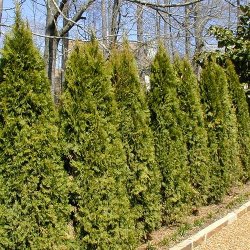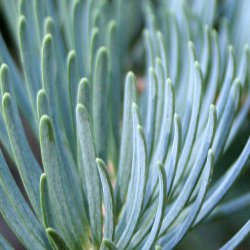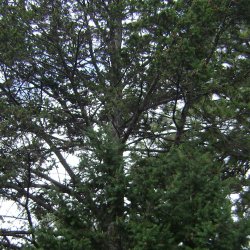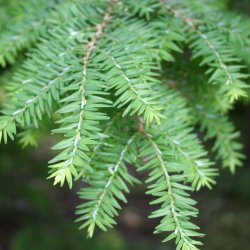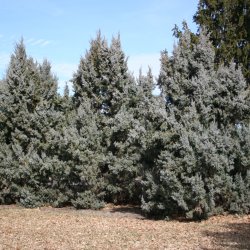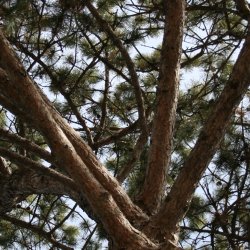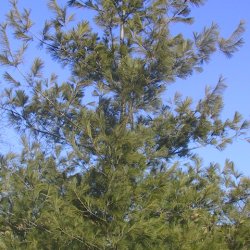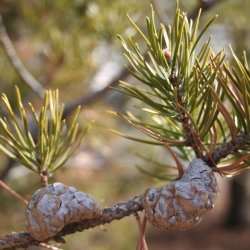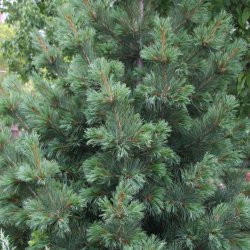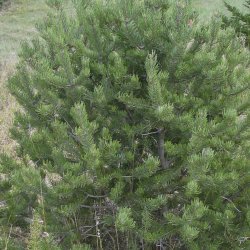Arborvitae, Eastern Coniferous
Thuja spp.
Eastern arborvitae is a relatively common landscape tree in the eastern half of Nebraska often used in foundation plantings and as screens along property lines. Mature trees may reach 30-40’ in time, but in cultivation typically grow only 10-25' tall, depending on the cultivar used.
Fir, Concolor (White) Coniferous
Abies concolor
Concolor fir is the most reliable and easy to grow fir for Nebraska. It has become relatively popular as a landscape tree and has also been utilized in some shelterbelts on favorable sites.
Fir, Douglas Coniferous
Pseudotsuga menziesii
Douglas fir is one of the most important timber trees in the United States and is the backbone of the western timber industry. The Rocky Mountain variety is more adaptable to the Great Plains and has been grown successfully across Nebraska, primarily as a landscape tree but sometimes in shelterbelts.
Hemlock, Eastern Coniferous
Tsuga Canadensis
Eastern hemlock is a shade-tolerant native of the eastern US growing from Minnesota to Maine and south to the higher elevations of Georgia. The tree is not abundant in Nebraska but is occasionally found in protected landscape plantings, especially where a shade-tolerant evergreen is desired.
Juniper, Rocky Mountain Coniferous
Juniperus scopulorum
As its name implies, Rocky Mountain Juniper is a common evergreen throughout the Rocky Mountains, extending into the Pine Ridge and Wildcat Hills of the Nebraska Panhandle. RM juniper is widely used in shelterbelts, wildlife plantings and landscape plantings in the western Great Plains.
Pine, Austrian Coniferous
Pinus Nigra
Austrian pine is a medium to large conifer that is native to southeastern Europe, especially the higher elevations of the Balkans and Turkey. It has been used extensively in shelterbelts across much of the central and northern Great Plains and is also used in park and landscape plantings. Diseases are now limiting its use in eastern Nebraska.
Pine, Eastern White Coniferous
Pinus strobus
Eastern white pine is a fast-growing and relatively long-lived, soft-needled evergreen native to the northeastern US and Canada. Its occasionally used for windbreaks and screens and has become a popular landscape tree in eastern Nebraska communities.
Pine, Jack Coniferous
Pinus banksiana
Jack pine is a scrubby, northern pine native to much of Canada and south to the Great Lakes and northern New England. It grows further north in Canada than any other native pine. It is extremely cold hardy and drought tolerant and has been used in shelterbelts and conservation plantings in Nebraska where little else will grow.
Pine, Limber Coniferous
Pinus flexilis
Limber pine is a medium-sized evergreen native to the Rocky Mountains from Canada to New Mexico where it’s typically found at elevations of 5,000 to 12,000 feet, often reaching the tree line. A few disjunct stands reach out on to the western High Plains including the Pine Bluffs area of western Kimball County, making it one of only two pine species native to the state, the other being Ponderosa pine.
Pine, Pinyon (Colorado Pinyon) Coniferous
Pinus edulis
Pinyon pine is native to the Four Corners area of Utah, Colorado, New Mexico, and Arizona where it is typically found growing with junipers on drier sites. It has been used in landscape and screen plantings in western Nebraska, especially the southern Panhandle.
